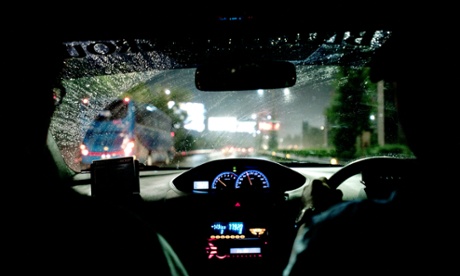
What causes car accidents? The question is prompted by a new study conducted at Loughborough University which shows that being dehydrated can induce as many driving errors as being drunk at the wheel. “We all deplore drink driving, but we don’t usually think about the effects of other things that affect our driving skills, and one of those is not drinking and dehydration,” Ron Maughan, emeritus professor of sport and exercise nutrition at Loughborough, told the Daily Telegraph.
Maughan set up an experiment in which normally hydrated and dehydrated people drove in a simulator for two hours. The normally hydrated drivers made an average of 47 errors; the dehydrated drivers 101 errors. Thus the dehydrated drivers made more than twice the number of errors of normally hydrated drivers – a failure rate similar to drink drivers. What the results tell me, though, is that even normally hydrated drivers don’t drive very well: 47 errors is a lot over two hours. I went to a conference on autonomous cars recently. Manufacturers argued that well over 90% of accidents are caused by human failure – hence the need, they said, for self-driving cars, which would save thousands of lives.
One American study suggests that the number one cause of accidents is the driver being distracted, most commonly by a mobile phone. Speeding comes second, drink driving third. I dislike driving at night – the last time I did so I hit a bollard as I rounded a corner – and in the rain, and my fears seem to be justified. According to this study, rain is the fifth-biggest cause of accidents and night driving is ninth – driving at night doubles the chance of you having a crash.
Equipment failure rarely causes accidents, though drivers will always seek to blame a fault with the car. A study by the Institute of Advanced Motorists in 2011 showed that two-thirds of accidents were caused by “driver error or reaction”. Alcohol played a part in almost 10% of fatal accidents, but most were simply down to bad driving. Trying to find a specific “cause” can, at times, be self-defeating.
The Loughborough report is useful in pointing out that the physical state of the driver is a significant factor in causing accidents – you need to be alert, well-hydrated and presumably well-slept. Perhaps someone could invent a machine for us to test our physical and mental capacity before we take the wheel. But I fear that, as the Loughborough study suggests, even those not suffering from dehydration, fatigue or other impairments will make mistakes. Driving is difficult – and I speak as someone who has written off three cars. Bring on the robots.

